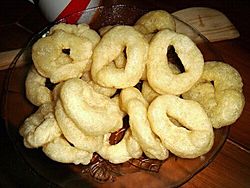Javanese doughnut facts for kids

A plate of javanese doughnut
|
|
| Alternative names | Donat jawa, gembus |
|---|---|
| Type | Doughnut |
| Place of origin | Indonesia |
| Region or state | Java |
| Created by | Javanese |
| Main ingredients | Cassava |
The Javanese doughnut, also known as donat jawa in Indonesian, is a special snack from Indonesia. In the Javanese areas, people call it donat jawa or gembus. Unlike many doughnuts you might know, this one is usually savoury, not sweet. It's made from cassava, which is a root vegetable, instead of regular flour or potatoes.
Contents
What is a Javanese Doughnut?
A Javanese doughnut is a traditional snack that looks like a doughnut but tastes different. It's often enjoyed as a savoury treat, meaning it's not sweet like a dessert. The main ingredient is cassava, a starchy root vegetable that grows in warm climates. This gives the doughnut a unique texture and flavour.
The Cassava Connection
Cassava is a very important plant in many parts of the world, especially in tropical areas. It's also known as yuca or manioc. The root of the cassava plant is used to make many different foods. For the Javanese doughnut, the cassava is prepared and then shaped into rings before being cooked. This makes it a gluten-free option for some people.
Where Does it Come From?
This special doughnut is very popular in Javanese cuisine. Javanese cuisine refers to the traditional foods from the Java island in Indonesia. You can find donat jawa all over Java, especially in places like Central Java, Yogyakarta, and East Java. It's a beloved part of the local food culture.
A Taste of Javanese Culture
The Javanese doughnut is more than just a snack; it's part of everyday life and celebrations. It shows how local ingredients like cassava are used in creative ways. Eating donat jawa is a way to experience the rich food traditions of Java.
When is it Eaten?
People in Java often enjoy these doughnuts during special events and gatherings. You might find them served at wedding parties, where families come together to celebrate. They are also a common snack during traditional performances. These include wayang shows, which are shadow puppet plays, and ketoprak theater, a type of Javanese drama. The doughnut is also enjoyed during Ramadan, a holy month for Muslims, often as a snack to break the fast.
Celebrations and Traditions
Serving donat jawa at these events adds to the festive atmosphere. It's a simple yet delicious food that brings people together. Whether it's a big family celebration or a cultural show, this doughnut is a welcome treat.
 | Anna J. Cooper |
 | Mary McLeod Bethune |
 | Lillie Mae Bradford |

